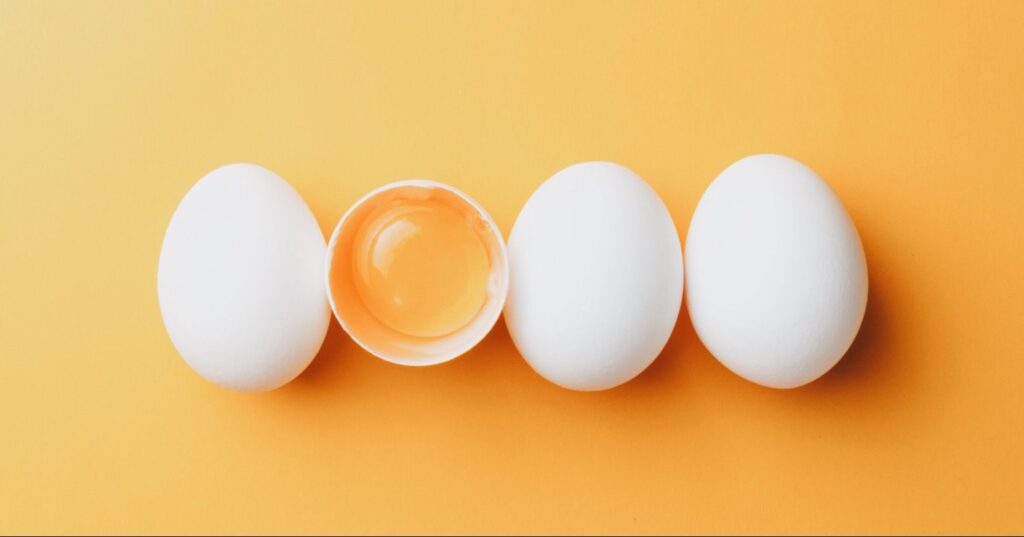In the near future, a pastry chef may whip up a batch of macarons, a colorful French confection made from meringue and almond flour, without having to crack an egg. In another kitchen, a baker pulls a light, fluffy, egg-free brioche loaf out of the oven. And in my home kitchen, I might recreate a family recipe for tiramisu, replacing eggs with a liquid or powder that functions just the same as chicken eggs.
It sounds like something out of a cyberpunk setting, but this is where the food system is headed. And it’s thanks to a technique that humans have been using for thousands of years: fermentation.
From sauerkraut in Germany and kimchi in Korea, to yogurts and aged cheeses in Europe, to tempeh in Indonesia, natto in Japan, beer, and more, nearly every major civilization has its own type of fermented food.
And, that beer you crack open during (digital) happy hour is created through that same ancient technique. Evidence of a fermented alcoholic beverage made from rice, honey, and fruit produced in the Henan province in China has been discovered in ancient pottery that dates back to 9,000 years ago, according to the Penn Museum.
It’s thanks to beer-brewers that Clara Foods, a San Francisco-based food technology startup, is nearing the launch of its animal-free egg protein. Earlier this year, the venture capital-backed company, a “graduate” of Indiebio’s accelerator program, announced its partnership with ZX Ventures, the innovation arm of the world’s largest brewer, AB InBev—the parent company of Budweiser, Corona, Modelo, and other well-known beer companies.
The relationship between the two is synergistic. Clara Foods uses precision fermentation, formerly called microbial fermentation, which is using microorganisms like yeast to produce specific proteins, such as whey, casein, and egg albumen, without the use of animals. And, ZX Ventures provides its know-how behind implementing fermentation on a large scale with the end goal being to make animal-free eggs accessible to a wider consumer base.

The Weird Science Behind the Next Vegan Egg
Simply put, precision fermentation adapts an age-old process to create proteins that contain the same amino acid profile, nutrition, and functionality of their animal-derived counterparts.
“In the same way that brewers use yeast to convert sugar into alcohol to make beer and wine, or that bakers use yeast to convert sugar into carbon dioxide to leaven bread, yeast can also be used to convert sugar into protein,” Clara Foods CEO and founder Arturo Elizondo tells LIVEKINDLY.
Elizondo likens the behavior of the yeast during this process to computer coding. “Only, instead of working with zeros and ones, they work with DNA. You insert a code for a particular protein and as the yeast eats sugar, instead of making alcohol, it starts producing protein.”
At the end of the fermentation process, you have a pure protein that, in a practical sense, is identical to the proteins that occur in nature. Identical, that is, without the cholesterol and all of the consequences that come with raising animals for food.
A former employee of the USDA’s Food and Safety Inspection Service, Elizondo is acutely aware of animal agriculture’s inefficiency in terms of resources. The behemoth of an industry accounts for 14.5 percent of human-caused greenhouse gas emissions. It takes 18 to 24 weeks before chickens begin to lay eggs, and it takes an enormous amount of resources to do so.
But a company like Clara Foods can create animal-free egg proteins in less than a week without harming chickens and with significantly less impact on the planet.

Why Do We Need a Vegan Alternative to Eggs Anyway?
Egg substitutes are nothing new. You can use ground flax and chia seeds, applesauce, vinegar mixed with baking soda, powdered egg replacers, and the JUST Egg, to name a few. Aquafaba, the liquid from a can of chickpeas, can be whipped like egg whites, but it has its shortcomings. (In the Facebook group Aquafaba (Vegan Meringue – Hits and Misses!), angel food cake remains the elusive white whale for professional and home bakers alike.)
At the end of the day, easy alternatives that function just like the ingredient they’re replacing have a strong appeal. And as reliable as many egg replacers are, they just don’t have the same chemical composition as a chicken egg, so they’re not a shoe-in for everything.
In cooking, every part of the cracked egg has a function, which is why it’s tricky to replicate certain recipes, like souffles and brioches, that call for eggs using vegan substitutes. The protein in eggs gives structure to baked goods, acting as a glue that binds ingredients together.
According to the Science of Cooking, egg yolks act as emulsifiers, which prevent fats and liquids from coalescing. (Think of it like shaking oil and water in a jar. When you shake the jar, the oil droplets disperse, but they eventually pool together again. Emulsifiers prevent that. Egg yolks contain a specific emulsifier called lecithin, a fat also found in soybeans.)
The protein-rich egg whites foam, bind, and jell, and they provide leavening—which is why angel food cake is so light and fluffy. The air that you introduce into egg whites when you whip them forces the proteins to unfold and then reform around the air bubbles into a foamy texture.
Cooking With Vegan Eggs Is Getting Easier Too
Clara Foods, Eunite Foods, and other egg alternatives are up against the beast of the industrial egg industry. According to the American Egg Board, 275.3 million U.S. eggs were distributed in 2019 for retail, foodservice, institution, and export
Similar to what Berkeley-based precision fermentation company Perfect Day is doing by selling its vegan whey and casein to companies to produce dairy-free ice cream (and soon, cheese), Clara Foods’ technology could replace chicken eggs in brioche, fresh pasta, cookies, and more.
According to Elizondo, it’s key that its egg alternative works like a chicken egg would. That’s because he believes that working with companies to replace eggs in existing products is how Clara Foods will make the biggest impact.
“We can make our own meringue [using our egg] but ultimately, our goal is to partner with bakeries to have them use our eggs to make products that they already make, like macarons and cakes,” Elizondo adds.
Early plant-based companies have helped build consumer familiarity with products that replace animal-based foods, which has helped pave the way for ingredients companies like Clara Foods, Motif FoodWorks (dairy and meat), Perfect Day (dairy), MeliBio (honey), and others whose products can act as one-to-one replacements for a specific animal-derived ingredient.
The challenge for companies that want to swap out eggs is finding a replacement that will provide the same binding, texture, and mouthfeel that consumers are already accustomed to.
Another company, Ontario, Canada-based Noblegen, also aims to replace chicken eggs with one made using a single-celled organism called euglena gracilis. This microorganism is found in fresh and salt water that is rich in organic matter, and it has both plant and animal characteristics. Noblegen’s euglena, which is processed into a flour, does not mimic any specific proteins found in chicken eggs. It is adjusted during the fermentation process to naturally change the nutritional profile.
“Protein from euglena doesn’t exactly mimic animal protein but it is built similarly from an amino acid perspective,” Bryan Reid, manager of communications at Noblegen, tells LIVEKINDLY. “Euglena also has the same ability to build muscle that animals do, making it a potential game-changer in the meat and dairy analogue industries.”
Through its food and ingredient brand, Eunite Foods, the company has launched a powdered vegan whole egg replacer called “the egg” made from pea protein and its proprietary “euglena flour.” It also contains methylcellulose, a plant cellulose-derived ingredient that acts as an emulsifier and that gels when hot temperatures are introduced.
Eunite Foods’ vegan egg also functions like a conventional chicken egg. It can be scrambled or be used for baking cakes. Unlike Clara, though, the Canadian startup is selling its products to consumers through its website in order to show foodservice companies what its products can do and to gain consumer feedback. The company is currently in the process of formulating a liquid version of its egg.
This vegan egg is made via fermentation, though not precision fermentation, like Clara Foods and so many other startups. However, it is part of a group of emerging brands that are using this age-old process to create new, more sustainable alternatives to foods that have been part of the human diet for thousands of years.


